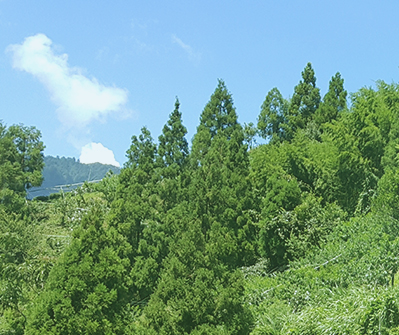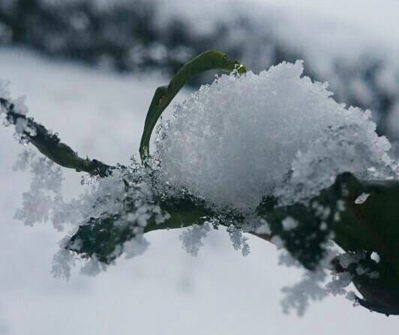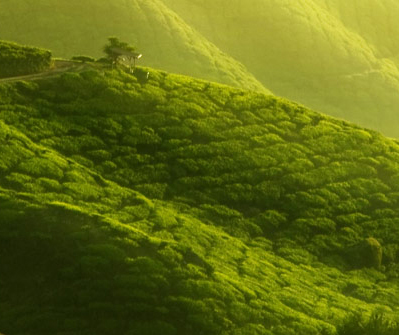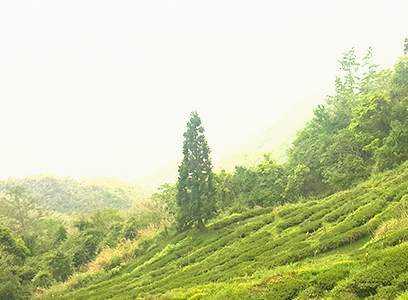
-

Environment
One of Tea Talent®'s tea plantations is located at an elevation of 1,600 meters on Mt. Lala in Taiwan’s Taoyuan County, and another is located at an elevation of 1,300 meters on a mountain ridge in Shanlinxi in Taiwan’s Nantou County—this second plantation has a unique location, and is at least two hours distant from the lowlands by car.
Because of the latitude and the very suitable mountain environment, the tea produced in these areas typically has extremely good quality and is a favorite with consumers. -

Climate
Taiwan's high mountains have a cool climate, with lots of morning sunshine and mountain mist in the afternoon. Because of a short average period of daily sunlight and large day-night temperature difference, tea plants tend to grow slowly. Because of this, the new leaves area soft, leaf tissue is thick, and pectin content is high. And due to these factors and the fact that mountain spring water used to irrigate the tea, the leaves have a fresh green color. Since Taiwan's high-mountain tea is grown in this superior natural environment, its quality is outstanding and the tea has a delicate fragrance and a sweet aftertaste.
-

Location
Apart from the special location of our tea plantations high on mountain ridges, they are also situated on gentle slopes sheltered by mountain walls and facing the south. Because we do not use herbicides or other chemicals, apart from the tea plants, many other plants grow nearby, and the natural ecology is bountiful. We are keenly aware that the quality of Taiwan's fine organic tea depends on a healthy environment.
Organic cultivation
National advantages
Tea Talent®'s tea plantations are situated among deep valleys and tall cliffs, extend to the top of mountain ridges, and are surrounded with wild mountain bamboo groves. The natural environment forms a natural buffer zone, and prevents contamination from any non-organic farms in the area. This ensures that the plantations have a naturally organic environment, and the soil is rich in organic matter. In an environment that is continually purified by natural processes, the soil and water nourish the land.
Human actions
In keeping with our love for Nature, we insist in using entirely organic cultivation methods, and try to give back to the land what we take from the land. Organic growing requires paying attention to the state of the land and soil, and striking a balance that will minimize harm from pests. The laws of nature must be taken into consideration in all things. Organic cultivation requires more patience and time than ordinary farming. But by relying on nature's ability to maintain an ecological balance, we can obtain truly pure and natural tea.
When chemicals have been used on a piece of land, it takes at least several decades to even begin to restore the soil ecology. Taking grasses as an example, the longer the time chemicals have not been used on a piece of land, the greater the variety of grasses that will grow there. This is a natural phenomenon that occurs as the environment returns to an ecological balance. The tea plantation on Mt. Lala has more than a dozen species of grasses, and there are seven or eight species growing at the tea plantation in Nantou County. These plantations are both the results of dedicated efforts to maintain the natural ecology. The environment in Tea Talent®'s tea plantations is entirely natural; the rare natural land comprising these plantations even supports such "national treasure" species as Swinhoe's blue pheasant and bamboo partridge.

Introduction to tea plantations
Mt. Lala organic high-mountain tea plantation, Taoyuan
Site of organic high-mountain tea plantation : Mt. Lala, Taoyuan County, Taiwan
Elevation : 1,600 meters
Farm : 3 hectares
This tea plantation is located along a mountain ridgeline, and the natural environment is free from all pollution. This site's conditions make it ideal for growing high-quality tea, which include an elevation of 1,600 meters, a high latitude, a cool climate, an annual average temperature of 16-18°C, humidity averaging 90%, a day-night temperature difference of more than 10°C, an intact surrounding forest, gravelly/rocky soil, and excellent drainage. The tea produced here has an even, tight consistency, plump leaves, and high pectin content. The dry tea has a glossy luster; when brewed, the tea is bright, clear, yellow, with an appealing appearance, and a sweet, mild taste. It has a unique floral and fruity scent that you will never tire of; its flavor is long-lasting, and it leaves a strong aftertaste.

The more you put into the cultivation of tea, the more tea will give you back. Tea Talent sees non-toxic agriculture and organic certification as its mission, and seeks to give the best results to consumers by maintaining a natural balance in its tea plantations.
Although the tea's inherent quality is a key element of fine tea, the experience and skill of master workers is an indispensable part of roasting fine tea. After taking the weather and other conditions when the tea was harvested into consideration, Tea Talent®'s tea professionals rely on their abundant experience to produce the tea using different method. As a result, our tea consistently achieves the finest standards of quality.
We employ unified management methods for the production of the tea used in all of our products. Our professional team cooperates in plantation cultivation management, tea production, packaging design, and marketing, and our tea professionals take great care throughout each step to produce only the absolutely finest tea, and ensure that customers can taste and appreciate truly fine tea.

EU organic certification

Japan JAS organic certification

ECOCERT EU organic certification

EU organic certification


